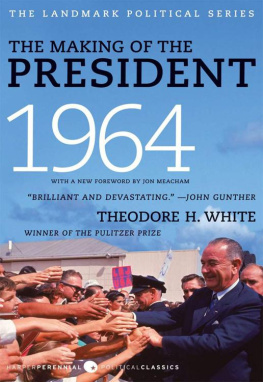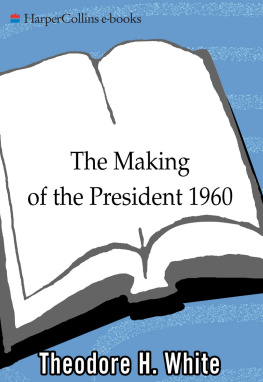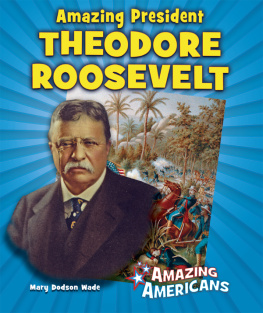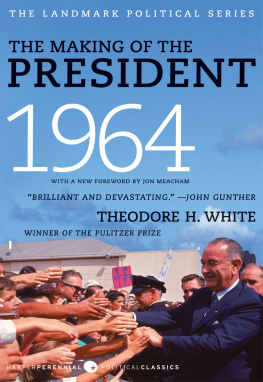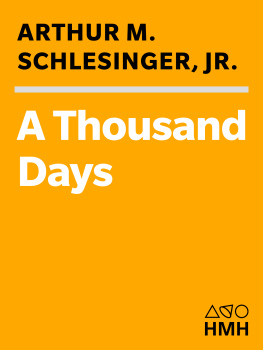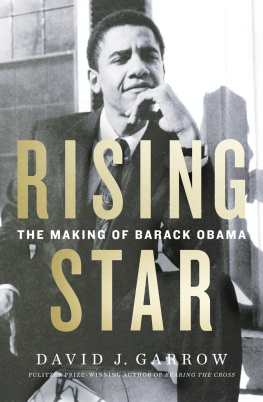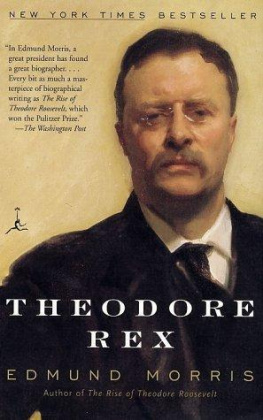Theodore H. White
H. CHOUTEAU DYER
L IKE MODERN American politics itself, this book begins with an ending: Dallas, Friday, November 22, 1963. With a novelists feel for character and drama, Theodore H. White opens his chronicle by putting his readers in the backseat of the presidential limousine carrying John F. Kennedy through the streets. It was hot; the sun was blinding; there would be a moment of cool shade ahead under the overpass they were approaching, White wrote. Then came the gunshots, and the blood, and the terror. To John Kennedy, the heat and the sun no longer mattered. The president of the United States was dead.
It is rarely given to us to be able to mark turning points in the life of the nation with such precision, moments after which nothing was the same. In that tragic autumn, Dallas joined Lexington and Concord, Appomattox, and Pearl Harbor as clearly discernible landmarks in our historical imagination, an inescapable signpost.
Whites Making of the President series, of which this is the second volume, is a landmark in its own right. In terms of the practice of American journalism and the writing of contemporary history, there is the pre-White era and the post-White eraeras that are as different from one another as silent movies were from talkies, or radio from television, or black-and-white from Technicolor.
That we take so many elements of Whites writing style as a given, half a century on, is evidence of the magnitude of his achievement. The rendering of presidential candidates as fully human characters, with emotions, uncertainties, and insecurities; the painting of political consultants and managers as critical figures, plotting and polling and maneuvering; and the casting of campaigns as sagas in which the contenders must do battle with one another and with fate: Such is now the expected stuff of political coverage. In Whites hands, beginning in 1960, the dry became the dramatic.
How did he do it? It seems simple now, but White was a pioneer in applying ancient storytelling devicestechniques and sensibilities at least as old as Homerto history. Character, scene, dialogue, and story arc became weapons in Whites arsenal as he lifted presidential politics from the sterility of newspaper copy to the stuff of legend. Before White, presidential campaigns were reported as though people had no sense that their rulers (and would-be rulers) were human; the dramatization of politics was for imaginative literature, not historical nonfiction. Shakespeare could plumb the anxieties of Henry V, and novelist Allen Drury might shed light on the darker corners of the capital, but their stories were confined to the safe playground of fiction.
Whites genius was to deploy the skills of a novelist in the pursuit of journalism. Though it is less well known today than the celebrated 1960 volume (a big bestseller and a winner of the Pulitzer Prize), The Making of the President 1964 resonates in our own time even more than its predecessor. The politics of race, the rise of the Republican Party (which would go on to win five of six presidential elections from 1968 to 1992), and Lyndon Johnsons outsized contradictions (which would lead him from a historic landslide to Vietnam) are all detailed in these pages, deftly and presciently.
Theodore White was both a maker and a mirror of the story of American journalism in the twentieth century. Born in 1915 in Boston and educated at Harvard, White rose to prominence as a journalist in Henry R. Luces Time-Life empire. The newsmagazine genre Luce created with co-founder Briton Hadden in the 1920s transformed the straightforward coverage of newspapers into colorful narratives, complete with heroes and villains. For Time and, beginning in 1933, Newsweek , reporting the news meant more than passing on the who, what, when, how, and why. It meant conjuring up a pageant of the interesting and the important.
Such was Whites world. Stylistically he was very much a creature of the midcentury newsmagazinea medium that not only had its virtues (a sense of drama, a passion for politics, an eye for narrative detail) but also its vices, including an occasional Olympian tone that may strike modern readers as stentorian. Yet, in a way, he was also a forerunner of the New Journalism of Tom Wolfe, Gay Talese, and Truman Capote, among others who, later in the 1960s and 1970s, pushed the boundaries further, turning reportage into literary nonfiction.
The key reason for Whites success was that he intuitively understood politicians. In his portrait of Lyndon Johnson, White diagnosed a condition he called the politicians optic, in which the hostile language in any press story leaps off the page while the positive recedes. By the same token, even the slightest compliment to an opponent swells to double-size capitals in the politicians gaze. This is an occupational disease of politicians, White notes, just as it is for authors and actors, who similarly live by public approval or distaste. Johnson loved the press, or hated it, depending on what was being said of him. Asked at a press conference whether he worried about overexposure, LBJ went into a slow burn, as White notes: Well, I strive to please, Johnson replied, and if youll give me any indication of how you feel about the matter, Ill try to work it into my plans in the future. He refused to speak to reporters again for four weeks.
Though politicians and their personalities dominate Whites canon, he also had a historians feel for the big picture. Here, for instance, is his encapsulation of the differences between the two major parties: The Democrats believe in governmentgovernment as an instrument to do things. The Republicans impossible dilemma is that they have never sorted out properly what it is that government should do and should not doand at what level. They campaign, generally, against government; the Democrats campaign, generally, for government. The Republicans are for virtue, the Democrats for Santa Claus. Looking at politics from the end of World War II forward, it would be difficult to improve on that basic observation.
Civil rights and the conservative reaction to the end of Jim Crow rest uneasily at the center of the story of 1964. White was present at the creation of the forces that would, in the fullness of time, give us the Southern Strategy and Willie Horton. Barry Goldwater is depicted in vivid colors, but what White calls the Goldwater movement was, even in real time, of larger importance than the candidate himself. The wordless resentments, angers, frustrations, fears and hopes that were shaping this force were something new and had welled up long before Goldwater himself took his Presidential chances seriously, White writes. Here is the rise of the West against the Eastern powers in GOP politics, the quiet but unmistakable shift of influence and clout from the ethos of Nelson Rockefeller to that of a man who spoke out for Goldwater just before the election in a hugely popular broadcast: Ronald Reagan.
Reagans name does not appear in Whites account of 1964 (and neither does that of a young man who ran, and lost, his first competitive race that year in Texas: George H. W. Bush), but the old Hollywood star who would become governor of California in two years time is the greatest of what White refers to as the seed-names of some entirely new era that was coming to be in 1964.

